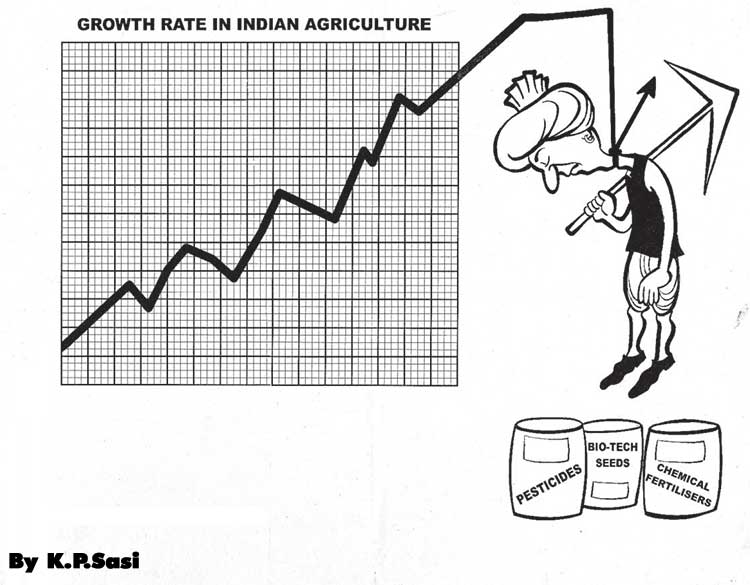
A very recent study on farmer suicides during 2000-2018 in six districts of Punjab has stated that as many as 88% of these were due to debts.
This study by Sukhpal Singh, Manjeet Kaur and HS Kingra of Punjab Agriculture University published in the Economic and Political Weekly has stated about this state, which has seen the most intensive form of the green revolution in India, “Of the total 9,291 farmer suicide cases, more than 77% were those of marginal and small farmers who cultivated up to two hectares of land. It is important to note that the number of these small landholdings is around 34% of the total landholdings in the state.”
Drawing attention to some other important aspects, this study says that 41% of the victims were in the age-group 31-35, 33% did not have any other earning members, 45% were illiterate and 96% were not involved in any socio-political activities.
The fact that literacy efforts have more or less eluded a significant number of villagers even in a highly developed state of India also indicates that a significant number of persons still feel very excluded and left-out due to this factor. There is also an indication in this data that socio-political mobilization reduces the sense of exclusion and pessimism even among indebted persons while who remain out of such mobilizations are more likely to lose hope and get depressed.
The most important implication of these findings which has a sense of urgency is that the families of most of these victims have been left in a very precarious condition and hence help for them should not be delayed.
The findings of this study should be related to the wider country-wide reality of crisis conditions faced by most small farmers. One important cause of this is that the technology which has been been promoted by the government as well as corporate agribusiness interests is a very expensive technology which also inflicts heavy environmental harm and this in turn leads to decreasing returns as well. As high expenses have to be incurred in any case under this technology, any adverse conditions, relating to weather or pests or other factors, can leave the farmer saddled with debts.
Secondly, changes in crucial sectors of education and health have been such that educational expenses are at high levels and even a single medical emergency can result in high indebtedness.
The spread of consumerist culture willy-nilly results in increase of several kinds of consumption expenditure as a demonstration effect. Perhaps the biggest burden relates to wedding and ceremonial expenditure. However the most harmful is the expenditure on liquor and other intoxicants as this also devastates health and gets people into all sorts of problems. With governments getting increasingly dependent on revenue relating to liquor and several politicians having links with the peddlers of intoxicants, it becomes difficult to get governments seriously involved in reducing the consumption of intoxicants, particularly liquor.
As some of the most serious problems of farmers have been caused by the unholy nexus of governments and business interests, it is difficult to imagine sustainable, credible, real solutions emerging from them. Instead one sees the union government getting involved even more with the biggest agribusiness corporations which are involved with promoting GM crops and foods. India has already become one of the biggest drivers of increasing alcohol consumption in world, with a significant part of the increasing consumption coming from liquor shops in rural areas as well.
Hence there is increasing need for people’s movements and farmers’ movements to opt for a combination of ecologically protective and justice driven practices (social agro ecology) that will bring down costs very significantly and increase self-reliance while providing a reasonable yield of healthier food which can also fetch a better price if sincere efforts are made. Landless peasants should also get at least some land.
These movements, with a significant presence of women, should also be involved in efforts to improve low-cost, good quality health care and education as well as social reforms to reduce the dowry system, expensive ceremonies, consumerism and above all the most harmful consumption of liquor and all intoxicants. Pressure should be increased on governments to contribute with policy measures for all this. Debt waivers can provide temporary relief but there is no short-cut to reduce indebtedness of farmers and much more comprehensive, sustained efforts are needed.
Bharat Dogra is Honorary Convener, Campaign to Save Earth Now, His recent books include A Day in 2017, Navjeevan and India’s Quest for Sustainable Farming and Healthy Food.











































